

Chile's drastic anti-obesity measures cut sugary drink sales by 23% The world’s toughest controls over the promotion of sugary drinks, brought in by a nation beset by obesity, have cut purchases by nearly a quarter in two years, research has shown.
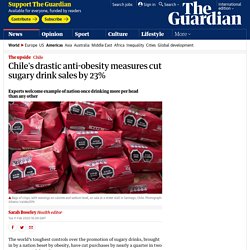
Instead of a sugar tax, which the UK and other countries have chosen to impose, Chile has banned sales in schools and adopted stark black and white labels aimed at warning and educating families about the health dangers of junk food and drinks for their children. Unlike the UK’s traffic lights, which may award a red label for sugar but also green for fruit content, Chile’s ministry of health labels only deliver the bad news: high in sugar, high in salt or high in fat. Manchester cycle network plan could be national blueprint, says Burnham. A joined-up cycling and walking network in Greater Manchester could provide a national blueprint for reducing congestion and air pollution and improving health, a report says.
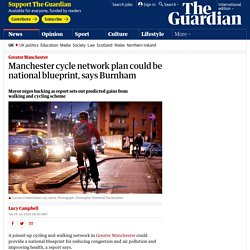
Teenagers campaign for 'traffic light' labels on food packaging. A fledgling campaign group led by teenagers is calling for traffic light-style front of pack labelling to be made mandatory in the UK.
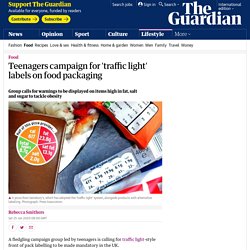
The Bite Back 2030 campaign said progress on improving child health was stalling and that the move would bring the UK in line with other countries. These include Israel, which this week announced new laws making warning labels compulsory on packaged products high in fat, salt and sugar. Alcohol sales rise near Scottish border after minimum pricing. Supermarkets close to Carlisle and Berwick reported a surge in alcohol sales after minimum unit pricing was introduced in Scotland.
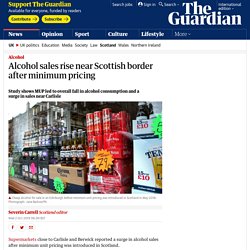
A study for NHS Scotland found that alcohol sales jumped by 40% in one English supermarket close to the border and 25% in another, in the three months after cheap alcohol sales were banned in Scotland. Article: A proposed approach to systematically identify and monitor the corporate political activity of the food industry with respect to public health using publicly available information - Mialon - 2015 - Obesity Reviews. Article: Environmental and Occupational Interventions for Primary Prevention of Cancer: A Cross-Sectorial Policy Framework. Article: Food policies for healthy populations and healthy economies. Article: How three countries in the Americas are fortifying dietary salt reduction: A north and south perspective. Article: Improving diet and physical activity: 12 lessons from controlling tobacco smoking.
Article: SHAPING THE CONTEXT OF HEALTH: A Review of Environmental and Policy Approaches in the Prevention of Chronic Diseases. A Top Trump Official Just Flunked The Jimmy Kimmel Test. BBC Newsnight: how companies are bending the rules on junk food advertising. Bike Lanes May Be The Most Cost-Effective Way To Improve Public Health. Amazing things happen to a city once people are encouraged to switch to bike commuting: the air quality improves throughout the city, which benefits everyone, not just cyclists.

Quieter roads are more pleasant roads to be around, and they’re less congested for those who still insist on driving. And of course riding a bike every day brings all kinds of health benefits to the cyclists themselves. A new study from researchers at Columbia University’s Mailman School of Public Health shows just how big those benefits can be. Per dollar spent, constructing bike lanes is a cheap way to improve public health. For instance back in 2005, New York City spent $10 million on curbing traffic as part of the federally-funded Safe Routes to School program. BMJ editorial on sugar and salt. Book chapter: Prevention of Obesity - Weighing the Options - NCBI Bookshelf. Britain Is The ‘Fat Man Of Europe’: So Why Won’t Government Invest In Healthier Food? ENOUGH. OUR HEALTH. OUR RIGHT. RIGHT NOW. Food subsidies and taxes significantly improve dietary choices. BOSTON (March 1, 2017)—A new systematic review and meta-analysis finds that lowering the cost of healthy foods significantly increases their consumption, while raising the cost of unhealthy items significantly reduces their intake.
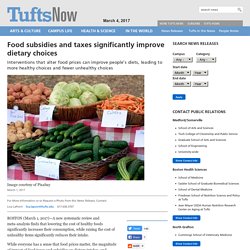
While everyone has a sense that food prices matter, the magnitude of impact of food taxes and subsidies on dietary intakes, and whether this varies by the food target, has not been clear. For the review, a team of researchers identified and pooled findings from a total of 30 interventional and longitudinal studies, including 11 that assessed the effect of higher prices (taxation) of unhealthy foods and 19 that assessed the effect of lower prices (subsidies) of healthy foods. The findings were published in PLOS ONE on March 1. “To date, evidence on effectiveness of fiscal policies on diet has mostly come from cross-sectional studies, which cannot infer causality.
“The global food system is causing a staggering toll on human health. How to tax sugary drinks - Soda stream. " id="ember2805492" class="ember-view">Finland’s bold push to change the heart health of a nation. Interview: BBC Radio 4 - The Life Scientific, Susan Jebb - Engaging with the food industry. Kellogg's to cut sugar in kids' cereals by up to 40% Cereals giant Kellogg's is to cut the amount of sugar in its three top selling children's cereals by between 20% and 40% by the middle of next year.
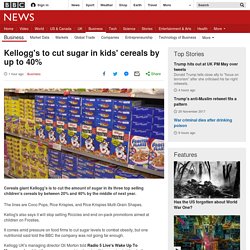
The lines are Coco Pops, Rice Krispies, and Rice Krispies Multi-Grain Shapes. Kellog's also says it will stop selling Ricicles and end on-pack promotions aimed at children on Frosties. It comes amid pressure on food firms to cut sugar levels to combat obesity, but one nutritionist said told the BBC the company was not going far enough. Kellogg UK's managing director Oli Morton told Radio 5 Live's Wake Up To Money podcast that "consumers are asking for a healthier way to start the day". "Taste and health have to go hand in hand," he added.
Leaked: Coca-Cola’s Worldwide Political Strategy to Kill Soda Taxes. The emails describe a wide-range of Coca-Cola actions Kyle Pfister/Medium Internal emails recently leaked to “DCLeaks” give the public new insight into Coca-Cola’s coordinated strategy to defeat public health policies at the local, state, national, and international levels.
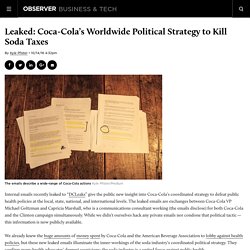
The leaked emails are exchanges between Coca-Cola VP Michael Goltzman and Capricia Marshall, who is a communications consultant working (the emails disclose) for both Coca-Cola and the Clinton campaign simultaneously. While we didn’t ourselves hack any private emails nor condone that political tactic — this information is now publicly available. We already knew the huge amounts of money spent by Coca-Cola and the American Beverage Association to lobby against health policies, but these new leaked emails illuminate the inner-workings of the soda industry’s coordinated political strategy.
They confirm many health advocates’ deepest suspicions: the soda industry is a united force against public health. Manchester. More active people for a healthier world, the global action plan 2018 - 2030. Regular physical activity is proven to help prevent and treat noncommunicable diseases (NCDs) such as heart disease, stroke, diabetes and breast and colon cancer.
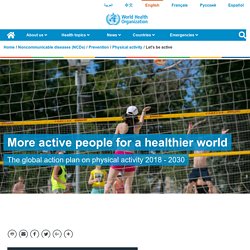
It also helps prevent hypertension, overweight and obesity and can improve mental health, quality of life and well-being. Yet, much of the world is becoming less active. WHO has developed a new global action plan to help countries scale up policy actions to promote physical activity. It responds to the requests by countries for updated guidance, and a framework of effective and feasible policy actions to increase physical activity at all levels. The plan sets out four objectives and recommends 20 policy actions that are applicable to all countries and address the cultural, environmental and individual determinants of inactivity. Working in partnerships, WHO will support countries to implement a whole-of-community approach to increase levels of physical activity in people of all ages and abilities. Nestlé to remove 10% of sugar from all snacks in UK and Ireland by 2018. Nestlé, one of the world’s biggest chocolate manufacturers, will take 10% of the sugar out of its confectionery in the UK and Ireland by 2018.
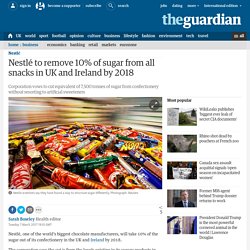
Nobody minds a gentle nudge, except in the wrong direction. We live in a time when government seems to have the Sadim touch: everything politicians lay their hands on turns into the opposite of gold. So it is a pleasant surprise when a significant piece of policy affecting the futures of millions of people is working as intended. Many folk park pensions in that segment of the brain where they keep things they know to be important, but find boring. Many folk would prefer to spend any surplus income today rather than save it for tomorrow. As a result, Britain has a serious problem. Not remotely refreshing: global health fund rebuked over Heineken alliance. A global health fund has come under severe criticism over its decision to partner with Heineken, a move campaigners warn will “undermine and subvert” alcohol policy implementation in Africa. In an open letter to the Global Fund to Fight Aids, Tuberculosis and Malaria, an alliance of more than 2,000 health organisations voiced misgivings about the alliance and called for its immediate end.
“We are deeply concerned about this partnership and its implications for global health,” read a letter signed by Katie Dain of the NCD Alliance, Kristina Sperkova of the anti-alcohol group IOGT International, and Sally Casswell of the Global Alcohol Policy Alliance. “A partnership such as this with the Global Fund is of great value to Heineken. It redirects attention from the costs of harmful use of alcohol and positions Heineken to governments, the public and the global community as a legitimate partner in implementing sustainable development solutions.” PLOS Medicine: Pragmatic Trials for Noncommunicable Diseases: Relieving Constraints.
Citation: Patel A, Webster R (2016) Pragmatic Trials for Noncommunicable Diseases: Relieving Constraints. PLoS Med 13(3): e1001986. doi:10.1371/journal.pmed.1001986 Published: March 29, 2016 Copyright: © 2016 Patel, Webster. This is an open access article distributed under the terms of the Creative Commons Attribution License, which permits unrestricted use, distribution, and reproduction in any medium, provided the original author and source are credited.
Public Health England’s new guideline for the food industry is unlikely to curb obesity. Public Health England (PHE) has published new guidelines for the food industry, setting out approaches manufacturers can take to reduce the amount of sugar children consume. The guidelines challenge the industry to cut sugar content in nine food categories, including breakfast cereals, puddings and confectionery, by 20% by 2020, and by 5% this year. Are these guidelines fit for purpose, or are they too little, too late? Obesity rates in the UK have risen dramatically over the past 20 years, leading to around one in four people being obese. Although these increases have slowed in recent years, an upward trend still continues. Read & act. The many hidden causes of childhood #obesity. Let's focus on solutions, not blame. #ICO2016 @foodrev.
Saving the NHS means forcing us to change the way we lead our lives. If you imagine a healthy future for Britain, or any other country that has put the hunger of millennia behind it, you see a kind of dictatorship. Not a tyranny, but a society that ruthlessly restricts free choice. Subsdising healthy food as an obesity prevention strategy. The heavy costs of an increasingly obese population are well known. Physical problems associated with a Body Mass Index over 30 include type 2 diabetes, strokes, and certain types of cancer.
Psychological issues include depression and low self esteem. But there is also a significant financial price to pay. Bangkok Post: lifestyle. A new excise tax will be provisionally introduced in September. Back in 2007, the average Thai consumed 20 teaspoons of sugar per day. But the worst was yet to come. Three years later, the estimated daily sugar intake was 23 teaspoons per person. Sugar tax has slashed sales of fizzy drinks in one of Britain's biggest cities. Sugar tax must apply to sweets as well as drinks, say campaigners. The sugar tax should be extended to cover sweets, not just soft drinks, according to public health campaigners. Taxing tobacco and the new vision for financing development. As part of the 2016 World Bank Group-International Monetary Fund Spring Meetings held this past week in Washington, D.C., a fascinating panel discussion, A New Vision for Financing Development, took place on Sunday, April 17.
Theconversation. One of the main talking points from the recent UK Budget, was the announcement of a tax on sugary soft drinks. But Mexico already has a sugar tax. Theconversation. Theguardian. The Real Cost of Food - can taxes and subsidies imrove public health? JAMA article. UK health body calls for Copenhagen-style bike-friendly streets. The streets of Britain could start to look like those of Copenhagen, where cycling is prioritised over cars, if local authorities act on new official health guidance.
The National Institute for Health and Care Excellence (Nice) is recommending that cars come last when new roads are built or old ones upgraded. What to do about the UK’s obesity problem?